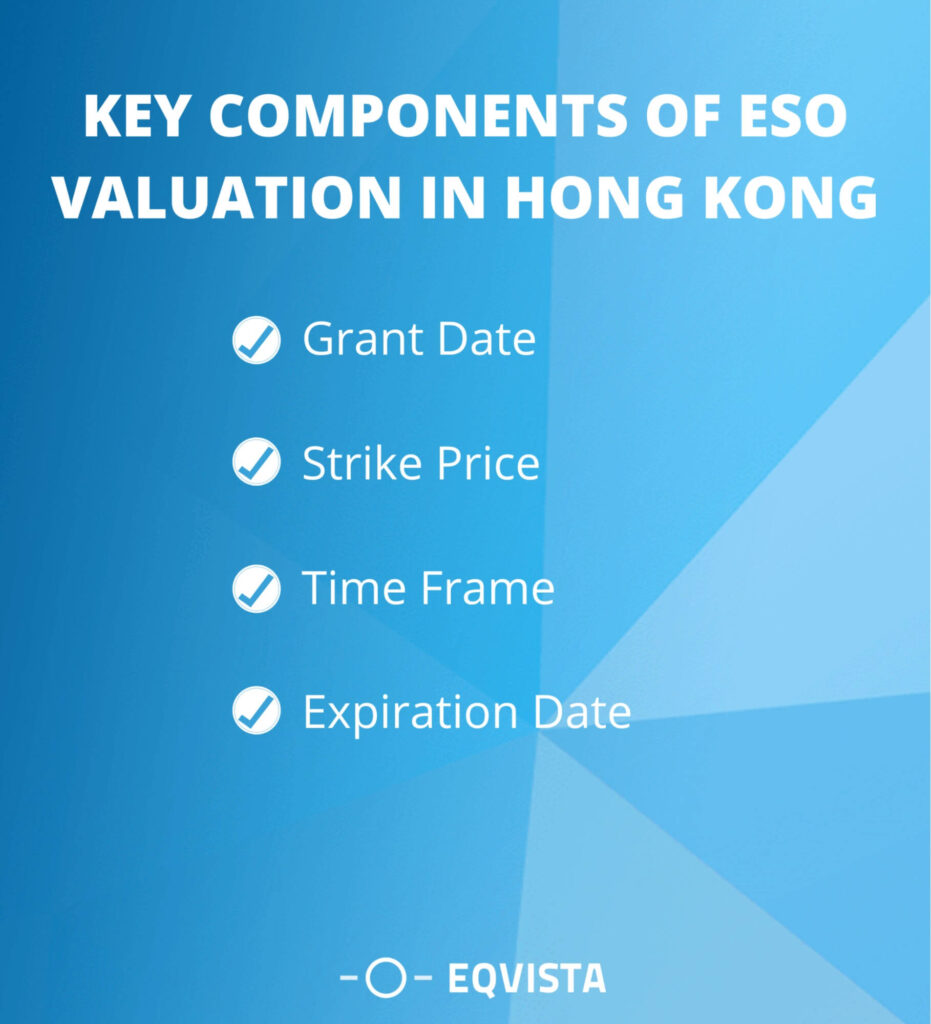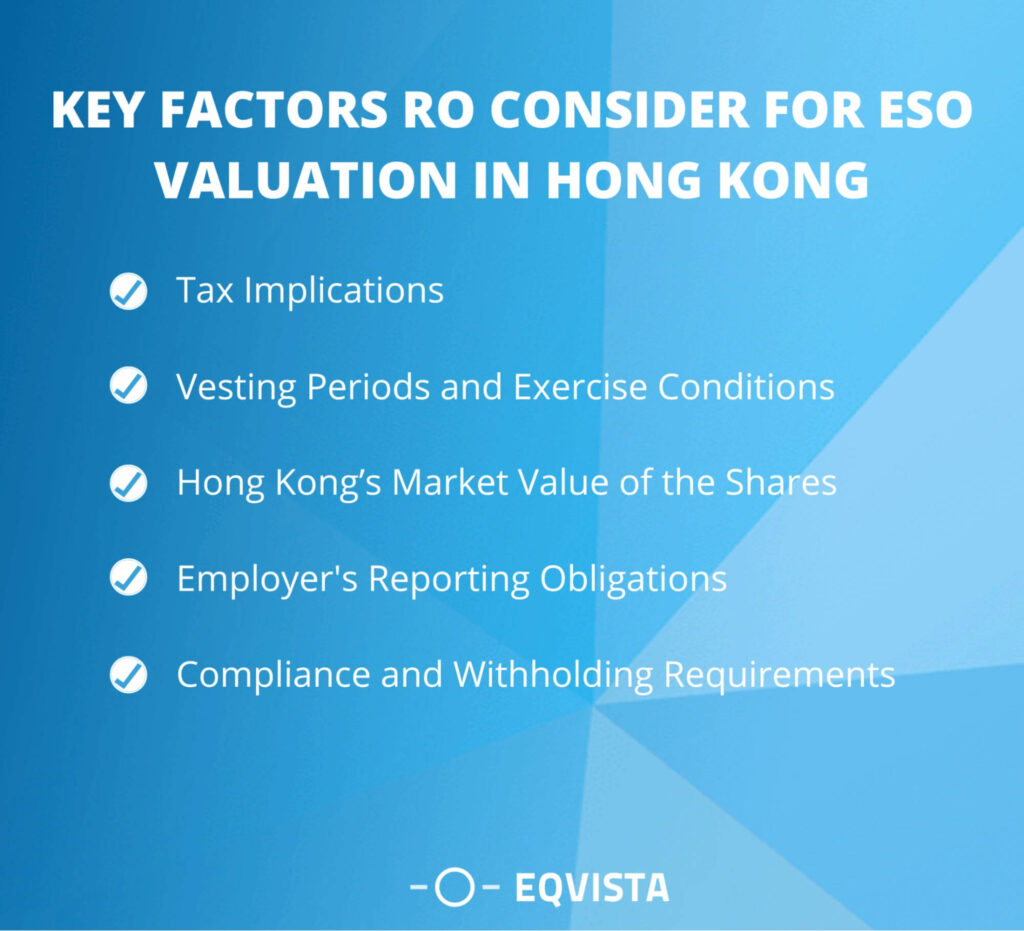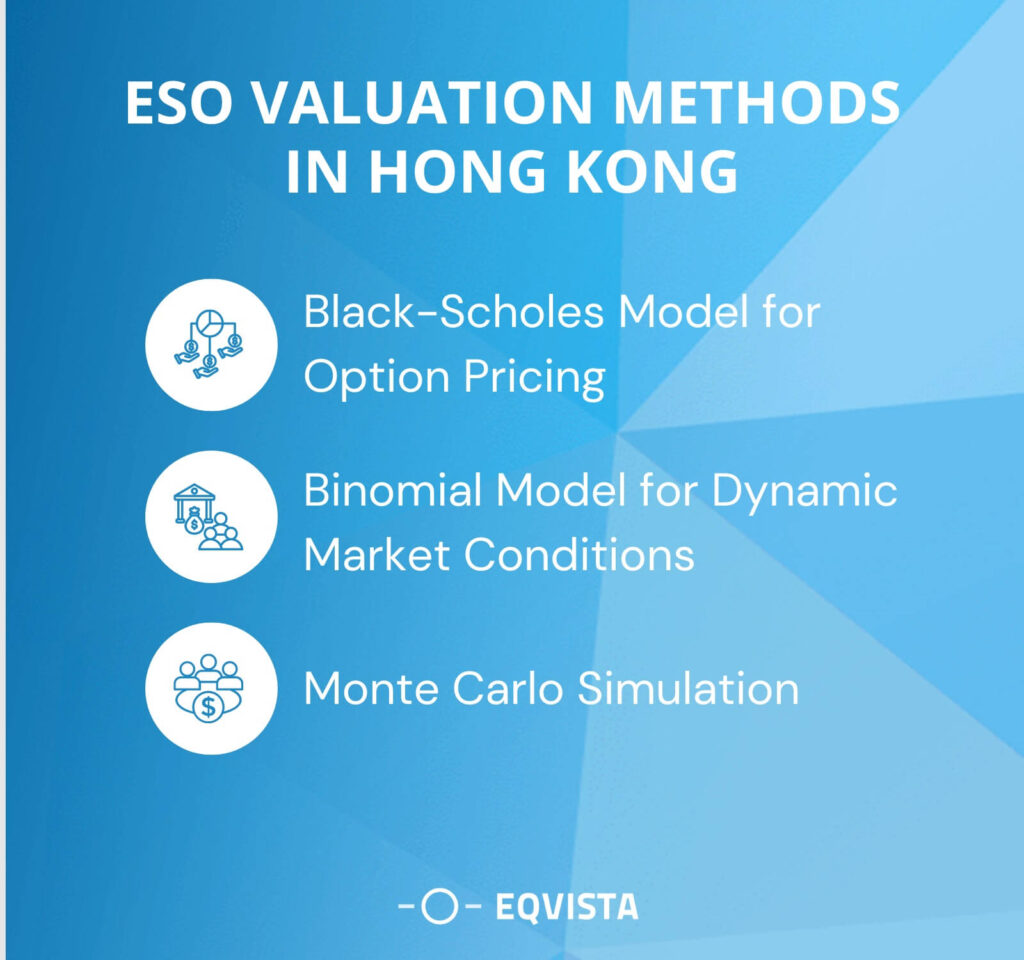Valuation of Employee Share Options (ESO) in Hong Kong
The trending rise in Employee Share Options (ESOs) is prevalent in Hong Kong. ESOs are a preferred method for attracting and retaining top talent. It’s a strategic move followed by both budding startups and established corporations.
ESOs are rights that allow employees to purchase company stock at a set price. They have become important for building long-term commitment and aligning employees’ interests with business growth. However, the ESO valuation in Hong Kong presents a few challenges. These include tricky legal frameworks and tax implications of ESOs in Hong Kong that demand careful guidance.
This article examines the critical details of accurate methods of ESO valuation in Hong Kong by ensuring companies effectively leverage this incentive by complying with Hong Kong ESO regulations.

ESO Valuation in Hong Kong
ESO valuation in Hong Kong assists businesses in grasping their actual value compared to market standards. Understanding the components of employee share options and the tax implications of ESO valuation in Hong Kong is essential. Let’s look into them further in this section.
What is ESO?
A company’s Employee Stock Option Plan allows workers to buy a certain number or percentage of shares at an exercise price. This setup offers a great chance for employees to benefit from the company’s future achievements and ensures their interests are closely tied to its progress and success. Additionally, they must abide by Hong Kong ESO regulations.
ESOs serve as a motivational tool by offering employees the chance to profit from the company’s future success, aligning their interests with its objectives. From the company’s perspective, ESOs are a practical way to reward and retain key talent, especially valuable for startups and early-stage companies with limited financial resources for cash remuneration.
Key components of ESO valuation In Hong Kong

The key components of an Employee Stock Option (ESO) scheme, essential for understanding how these plans function and benefit both employers and employees, include:
- Grant Date: This is the date when the company offers options to its employees. It marks the beginning of the process where employees receive the right, but not the obligation, to purchase company shares at a predetermined price.
- Strike Price: This is the price at which an employee can purchase future shares according to the ESO terms. It usually matches the share market price on the grant date.
- Time Frame: This is the period an employee needs to wait before being able to purchase shares. The vesting schedule plays a vital role in encouraging employees to remain with the company for an extended period and actively participate in its development.
- Expiration Date: Options have a limited lifespan. The expiration date is the final date the employee needs to exercise their options before they become worthless.
How does ESO in Hong Kong work?
In Hong Kong, companies can provide Employee Stock Options (ESOs) based on factors like tenure or performance, making the benefits available to employees, directors, officers, and consultants. Establishing an ESO requires shareholders’ approval and issuing an ‘Option Certificate’, such as vesting schedules and the exercise price. It is essential to keep precise records and adhere to legal requirements when employees exercise their options.
The tax implications of ESOs in Hong Kong are noteworthy. While there is no tax on the grant of a stock option plan, the exercise of options is taxable. The company and the employee must report the exercised options to the Inland Revenue Department, with taxes applied on the gain realized from the exercise price. ESOs do not count as relevant income for Mandatory Provident Fund (MPF) purposes.
Regulatory Landscape for ESO Valuation in Hong Kong
The regulatory framework for ESO valuation in Hong Kong requires compliance with updates to the Hong Kong Stock Exchange (HKEX) Listing Rules starting from January 1, 2023. These changes affect all share schemes that include grants of share awards and options.
Companies listed on HKEX must follow the Listing Rules. It includes listing requirements, obligations of listed companies, and compliance enforcement. The goal is to provide flexibility while safeguarding shareholders from excessive dilution by establishing scheme mandate limits and restrictions on scheme terms.
Issuers must examine and ensure compliance with these guidelines for both new and existing share schemes. The criteria for appropriate classification will depend on where the scheme shares originate. This initiative highlights the importance of precise and transparent ESO valuation in Hong Kong under a uniform regulatory framework.
Key factors to consider For ESO Valuation in Hong Kong

When valuing employee share options in Hong Kong, several key factors demand careful consideration:
Tax Implications
Valuing employee share options requires a thorough understanding of the tax implications. The tax implications of ESOs in Hong Kong may differ depending on various factors, including
- The type of option plan (e.g., statutory vs. non-statutory),
- The timing of option exercise (e.g., upon vesting or at a later date), and
- The tax residency status of the employee.
Employers must consider the effects of all applicable tax legislation, such as capital gains tax, income tax, and tax treaties.
Vesting Periods and Exercise Conditions in Hong Kong
The length of the vesting term and the conditions for taking the options greatly impact how much employee share options are worth today. The options’ perceived value may decrease with longer vesting periods or stricter exercise requirements. Various factors like achieving performance goals, length of employment, and market trends can influence when and how stock options are exercised.
Hong Kong’s Market Value of the Shares
Accurately determining the market value of the company’s shares is essential for valuing employee share options. Various ESO valuation methods in Hong Kong, such as the Black-Scholes or binomial models, help estimate the fair value of the options. Fluctuations in the market value of the company’s shares can directly impact the potential value of the options, necessitating periodic reassessment of their valuation.
Employer’s Reporting Obligations
Employers must meet reporting requirements regarding employee share options according to applicable accounting standards (e.g., IFRS 2) and regulatory guidelines. It involves revealing details about the options granted, exercised, or expired in the company’s financial statements and annual reports. Financial reporting is more open and accountable when all parties involved comply with their reporting responsibilities.
Compliance and Withholding Requirements
It is crucial to comply with Hong Kong ESO regulations to mitigate legal risks related to issuing and taxing employee share options. Employers must comply with the regulations outlined in the Securities and Futures Ordinance and the Inland Revenue Ordinance. Moreover, based on the location and tax regulations, employers might need to deduct taxes on option gains when exercised or vested.
ESO valuation methods in Hong Kong

ESO valuation methods in Hong Kong cover several techniques tailored to the unique dynamics of the market. Let’s look at them one by one.
Black-Scholes Model for Option Pricing
This widely used model calculates the theoretical price of options, including employee share options, based on variables such as
- The current stock price,
- The option’s strike price,
- Time to expiration,
- Risk-free interest rate, and
- Underlying stock volatility.
While the Black-Scholes model provides a straightforward framework for valuing options under certain assumptions, its limitations include the assumption of constant volatility and the requirement for the underlying stock to follow a log-normal distribution.
Binomial Model for Dynamic Market Conditions
Unlike the Black-Scholes model, the binomial model accommodates dynamic market conditions by simulating the underlying stock’s possible future price paths. This discrete-time model allows for volatility and other factor adjustments over time, making it suitable for ESO valuation in Hong Kong’s fluctuating markets.
The binomial model offers a more realistic approach to option pricing under changing market conditions by incorporating flexibility and adaptability.
Monte Carlo Simulation
Monte Carlo simulation includes running multiple iterations of potential future scenarios to estimate the value of employee share options. This method uses random values for key variables like stock price movements and volatility to offer a thorough evaluation of option value, taking into account various potential outcomes.
Monte Carlo simulation is a reliable technique for ESO valuation in Hong Kong’s corporate climate. And it works well with complicated option structures and unpredictable market conditions.
How to choose the right method for ESO valuation in Hong Kong?
Choosing the right method for ESO valuation in Hong Kong involves understanding the specific characteristics of the options and the market context.
The Black-Scholes model is apt for European options with relatively stable market conditions. The Binomial model is right when the options have tricky features like early exercise, which is common with American options. Monte Carlo Simulation is good for options with path-dependent features and highly volatile market conditions.
Companies must consider factors to decide the most appropriate method,such as ,
- nature of the ESOs,
- market volatility, and
- regulatory requirements
For example, a startup with volatile stock will choose Monte Carlo Simulation because it captures the possible future stock prices. In contrast, a more established company with stable growth might opt for the Black-Scholes model.
Best practices for ESO valuation in Hong Kong
Consider these guidelines for optimal ESO valuation in Hong Kong:
- Expert Support: Get advice from financial professionals who are well-versed in local regulations. Experts can guide you in selecting the appropriate valuation method for your unique ESO plan, considering variables such as market volatility and the type of options issued.
- Transparency & Communication: Keep the lines of communication open with all parties concerned, especially employees who own the other options. Openly communicate the process used to determine the valuation and any underlying assumptions to promote transparency and build trust.
- Periodic Review & Update: Market circumstances and internal company developments impact the ESO valuation in Hong Kong. Make sure to consistently review and adjust the valuation to accurately represent the current market conditions and any notable changes in the company’s operations or financial standing.
Eqvista is one of the leading Business valuation firms in Hong Kong, providing services for valuing businesses, financial reporting support, major transaction disclosure assistance, and more. Eqvista’s ESO valuation is tailored and uses various valuation methodologies to meet specific business needs and regulatory requirements in Hong Kong.
Tax implications of ESO valuation in Hong Kong
The tax implications for ESO valuation in Hong Kong primarily revolve around the point of exercise and sale. Both employers and employees must grasp these implications to handle potential tax liabilities. It is advisable to seek guidance from a tax professional for in-depth tax advice.
Eqvista, the leader in Business valuation, is crucial in providing accurate ESO valuation. Utilizing the services of a professional business valuation firm like Eqvista offers several benefits. Eqvista’s ESO valuations are also accurate and transparent.
Eqvista’s ESO valuation provides valuable insights for strategic decision-making, regulatory compliance, risk assessment, and financial reporting needs.
Get your ESO Valuation in Eqvista!
Efficiently managing Employee Share Options (ESO) is crucial for companies to incentivize their teams while maintaining compliance with Hong Kong ESO regulations. Eqvista is an advanced platform that offers tailored solutions for ESO management and facilitates seamless tracking and valuation of share options. Our user-friendly interface and tools will help businesses to streamline their equity management processes.
Choosing the right business valuation firm is important if you want to obtain accurate valuations in Hong Kong. One of the leading companies in this field is Eqvista, which offers valuation services in Hong Kong. With extensive industry knowledge, expertise in various valuation methodologies, regulatory compliance, and a commitment to delivering transparent and credible valuation services customized to clients’ requirements, Eqvista is a standout company. Eqvista’s ESO valuation services help you to make informed decisions about your business in Hong Kong. For more information and to get started, call us right away!
